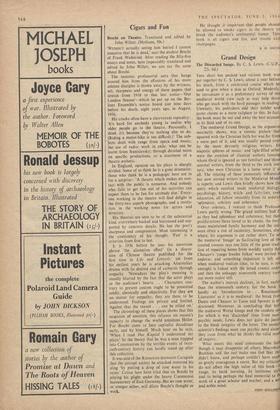Cigars and Fun
Brecht on Theatre. Translated and edited by John Willett. (Methuen, 50s.)
`WITHOUT actually seeing him buried I cannot conceive that he is dead,' says the student Brecht of Frank Wedekind. After reading the fifty-five essays and notes, here impeccably translated and edited by John Willett, we can say the same about Brecht.
The teutonic professorial aura that hangs around him from the effusions of his more solemn disciples is blown away by the wryness, wit, sharpness and energy of these papers that stretch from 1918 to that last notice—'Our London Season'—which he put up on the Ber- liner Ensemble's notice board just nine days before his death, eight years ago, in August, 1956.
His cracks often have a clairvoyant topicality: 'It's hard for anybody young to realise why older people go to the theatre. Personally, I think it's because they've nothing else to do. (Riding a motor-bike is too difficult.)' The sub- jects dealt with range from opera and music; the use of radio; work in exile; what can be learnt from Stanislaysky; through detailed notes on specific productions, to a statement of a theatre aesthetic.
In England, opinion on his plays is sharply divided. Some of us think he is a great dramatist; those who think he is a pedagogic bore are in for a surprise: 'A theatre which makes no con- tact with the public is nonsense. And nobody who fails to get fun out of his activities can expect them to be fun for anybody else.' Every- one working in the theatre will find delight in the forty-two superb photographs, and a revela- tion in the working notes for actors and directors.
His theories are seen to be of the substantial kind, everywhere backed and buttressed and sup- ported by concrete details. He has the poet's sharpness and compression. Most interesting is the consistency of his thought. 'Fun' is a criterion from first to last.
It is 1936 before he uses his notorious phrase 'the alienation effect' (in a discus- sion of Chinese theatre published for the first time in Life and Letters): yet from his earliest years he is attacking Aristotelian drama with its desired end of catharsis through empathy. 'Nowadays the play's meaning is usually blurred by the fact that the actor plays to the audience's hearts. . . . Characters con- trary to present custom ought to be presented coldly, classically and objectively. For they are no matter for empathy; they are there to be understood. Feelings are private and limited. Against that the reason . . . can be relied on.'
The chronology of these pieces shows that this suspicion of emotion, this reliance on reason's capacity to change the world antedates Hitler. For Brecht came to hate capitalist decadence early, and by himself. Much later on he says, `When I read Das Kapital I understood my plays.' So the theory that he was a man trapped into Communism by the terrible events of twen- tieth-century history can hardly stand up after this collection.
It was said of the Rumanian dramatist Caragiale that the corrupt society he attacked removed his sting `by putting a drop of rose water in his veins.' Critics here have tried that on Brecht by pitying his plight under the heavy Communist bureaucracy of East Germany. But no rose water, or vinegar either, will dilute Brecht's thought or work. He thought it important that people shoull be allowed to smoke cigars in the theatre ti break the audience's sentimental trance. Thi book is all cigars and fun, and reason • am champagne.
R. D. SMITI






































 Previous page
Previous page